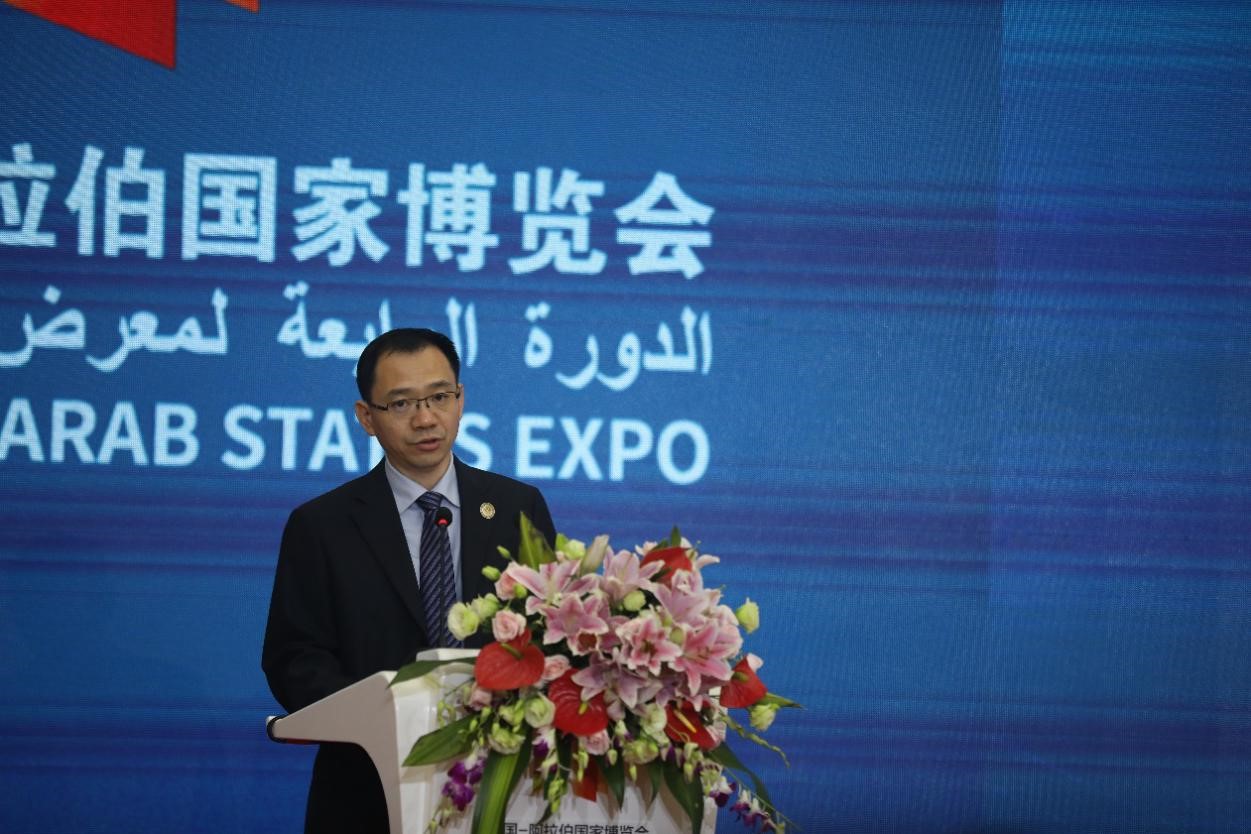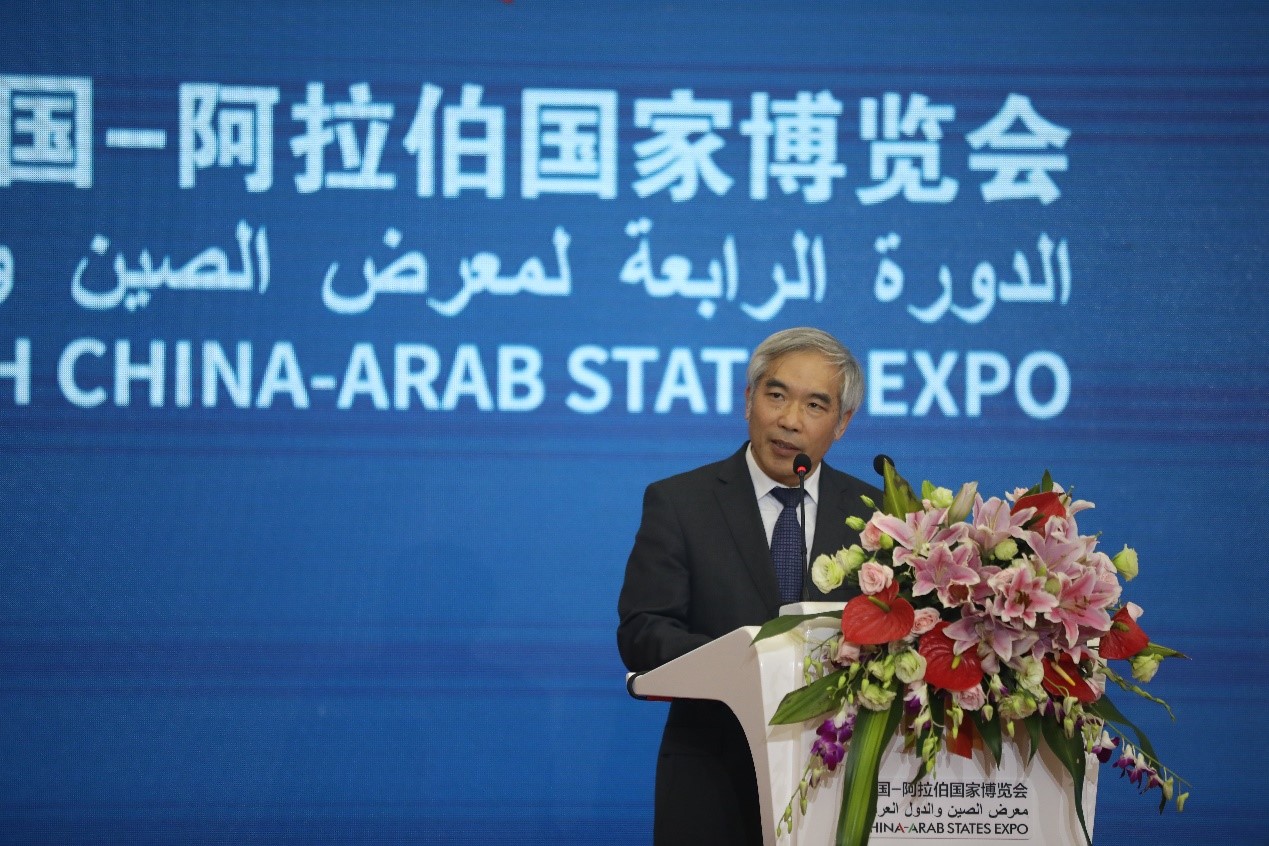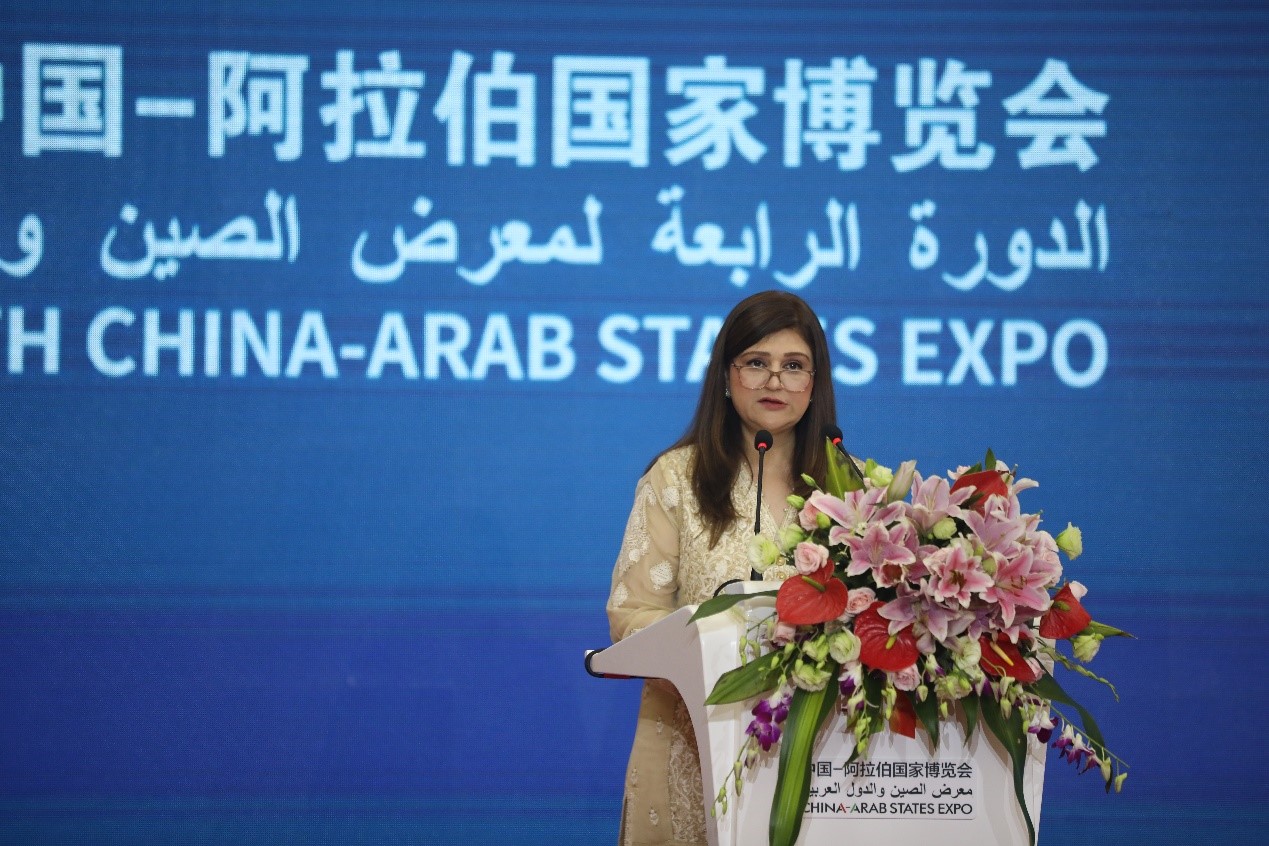


Promotion meeting of Overseas Economic Cooperation Zones (He Zhuoyan/ People’s Daily Online)
“China–Pakistan Economic Corridor (CPEC) is one corridor with many doors,” said Fareena Mazhar, Executive Director of the General of Board of Investment of Pakistan at the promotion meeting of Overseas Economic Cooperation Zones held on Sept. 6 during the China-Arab States Expo.

Liu Minqiang, Vice Director of Department of Outward Investment and Economic Cooperation of Ministry of Commerce of the People’s Republic of China (He Zhuoyan/ People’s Daily Online)
As an important carrier of the Belt and Road international cooperation, overseas economic and trade cooperation zones play an increasingly important role in international economic and trade exchanges. The building of economic corridors is an exemplary model to follow when it comes to international economic cooperation, whether it takes place in Pakistan or Arab countries or even in the world.
“In 2018, China’s FDI ranked second in the world and the stocking investment ranked third in the world, “said Liu Minqiang, Vice Director of Department of Outward Investment and Economic Cooperation of Ministry of Commerce of China, affirming China’s important role in contributing to the global growth.
“We will take openness, inclusiveness, and mutually benefiting as our guiding principles. We will allow the economic structure, natural endowment and cultural traditions of Belt and Road countries to connect with each other so that we could promote further connectivity while respecting the differences between different countries,” added Liu, addressing China’s willingness to cooperate with countries along the Belt and Road routes under the principle of mutual respects.
He also mentioned that it is pivotal to support market entities, build facilitation platform for cooperation, and build demonstration industrial parks while following the philosophy of green development and sustainability.
As of the first half of 2019, Chinese enterprises have invested and constructed 113 cooperation zones in more than 40 countries, with a cumulative investment of 36.6 billion US dollars. More than 4,000 enterprises have entered the cooperation zones and have paid 3 billion US dollar taxes and dues to the host country, creating 265,000 jobs in the region.
The success of China’s economic cooperation with foreign countries was reaffirmed by Sun Yaoguo, the General Engineer of China Road and Bridge Corporation.
“Our efforts have been recognized by the foreign governments,” said Sun, “President Xi Jinping proposed that we need to promote the development of economic corridors and build economic and industrial parks. So, over the past years, the industrial parks have grown from zero to a big scale and have received tangible results.”

Sun Yaoguo, General Engineer of China Road and Bridge Corporation (He Zhuoyan/ People’s Daily Online)
“We have also facilitated the industrialization process of the Belt and Road countries, and it is an important carrier for the construction of the Belt and Road Initiative. The going out of Chinese companies are accelerating. One consensus is that overseas economic cooperation is an important platform for Chinese companies going abroad,” added Sun.
Sun’s words are echoed by Fareena Mazhar. During the meeting, she said that in the shape of CEPC, both governments have made joint efforts to focus on expanding economic dimensions of the relationships and bring it into industrial parks with excellent cooperation that two countries enjoy at economic and political levels.
“It is high time to go a step forward and do concrete and focused efforts on populating industrial zones either to invest in and build infrastructure or relocation of Chinese labor-intensive industry,” said Fareena, “The government of Pakistan is committed to providing business-friendly incentive packages aimed at up-scaling investment relations with China to grow the industries and employment.”

Fareena Mazhar, Executive Director of the General of Board of Investment of Pakistan (He Zhuoyan/ People’s Daily Online)
She also highlighted the advantage of Ningxia Hui Autonomous Region, in terms of searching for future cooperation between Ningxia and Pakistan. “There are also plenty of sectors with absolute advantages in Ningxia that match those in Pakistan,” said Fareena, “I hope more and more enterprises from Ningxia can get a better understanding of Pakistan in terms of the market and enter into further cooperation.”
Several representatives from Chinese enterprises demonstrated investment advantages in countries along the Belt and Road routes, including demonstrations pertaining to the Pakistan Rashakai Special Economic Zone, China-UAE Industrial Capacity Cooperation Demonstration Zone and China-Egypt Mankai Textile Industrial Park, therein seeking opportunities for potential economic cooperation.

 Award-winning photos show poverty reduction achievements in NE China's Jilin province
Award-winning photos show poverty reduction achievements in NE China's Jilin province People dance to greet advent of New Year in Ameiqituo Town, Guizhou
People dance to greet advent of New Year in Ameiqituo Town, Guizhou Fire brigade in Shanghai holds group wedding
Fire brigade in Shanghai holds group wedding Tourists enjoy ice sculptures in Datan Town, north China
Tourists enjoy ice sculptures in Datan Town, north China Sunset scenery of Dayan Pagoda in Xi'an
Sunset scenery of Dayan Pagoda in Xi'an Tourists have fun at scenic spot in Nanlong Town, NW China
Tourists have fun at scenic spot in Nanlong Town, NW China Harbin attracts tourists by making best use of ice in winter
Harbin attracts tourists by making best use of ice in winter In pics: FIS Alpine Ski Women's World Cup Slalom
In pics: FIS Alpine Ski Women's World Cup Slalom Black-necked cranes rest at reservoir in Lhunzhub County, Lhasa
Black-necked cranes rest at reservoir in Lhunzhub County, Lhasa China's FAST telescope will be available to foreign scientists in April
China's FAST telescope will be available to foreign scientists in April